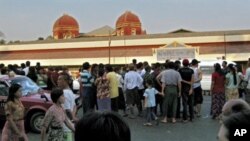A series of explosions in Burma have killed at least nine people and injured scores more.
Officials in Burma say there were three explosions Thursday afternoon in Rangoon, the country's largest city and former capital.
The blasts occurred in a park near Kandawgyi Lake where hundreds of people were celebrating an annual New Year's water festival.
The cause of the blasts is not known but authorities usually point the finger at ethnic rebel groups that have for decades been fighting against the military government.
Burma's military has been moving in on rebel and cease-fire groups to pressure them into submission.
Zin Linn, a spokesman for Burma's government in exile, says many of the armed groups oppose controversial elections the government plans to hold this year and that the explosions are a warning.
"These blasts are signs that if they go ahead with this election, with this constitution, there will be new civil strife, new civil war," he said.
Burma plans to hold its first elections in twenty years sometime later this year but authorities have yet to announce a date.
Rights groups and many western governments have dismissed the elections as a sham designed to keep the military in power.
A 2008 constitution it drafted guarantees the military a quarter of seats in the parliament, regardless of elections. Its election laws force political parties to expel current and former political prisoners from their ranks or face dissolution.
The biggest opposition party, the National League for Democracy, won Burma's last election in 1990 but the military ignored the results. A campaign of arresting and harassing NLD members led many to flee to Thailand where they formed the government in exile.
The authorities have kept the leader of the NLD, Nobel Prize laureate Aung San Suu Kyi, locked up for most of the time since. Her house arrest was extended by 18 months in August for allowing an uninvited American man to stay in her house without official permission.
The NLD has refused to take part in the elections.
Explosions in Burma Kill at Least 9, Injure Scores




